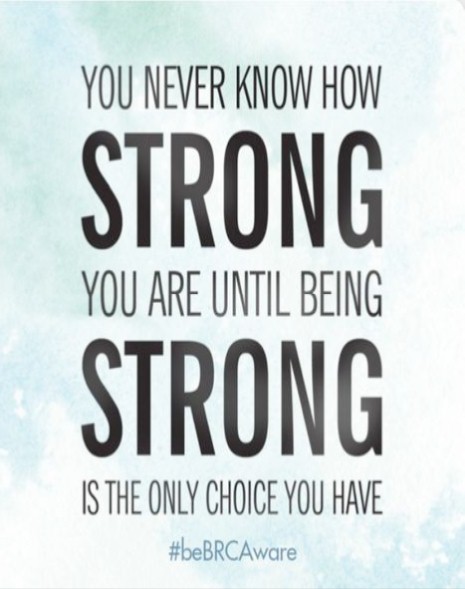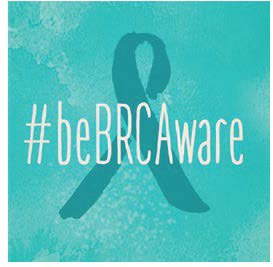This is a sponsored post for SheSpeaks/AstraZeneca.
“You should have your ovaries removed.”
 Sitting in her hospital bed, wrapped in blankets, my mother peered across the room at me. I’d heard this before from her. Diagnosed with ovarian cancer nearly ten years earlier, my mother had survived several extensive surgeries and countless rounds of debilitating chemotherapy. She’d lost her hair so much from the drugs that my kids were surprised when she wasn’t bald. It had been a long decade and she was worn out.
Sitting in her hospital bed, wrapped in blankets, my mother peered across the room at me. I’d heard this before from her. Diagnosed with ovarian cancer nearly ten years earlier, my mother had survived several extensive surgeries and countless rounds of debilitating chemotherapy. She’d lost her hair so much from the drugs that my kids were surprised when she wasn’t bald. It had been a long decade and she was worn out.
“I don’t want you ever to go through this. You don’t need your ovaries anymore—you have your kids. You should think about it.”
My mom passed away a short time later.
My mother will not be the only woman to die from ovarian cancer this year; ovarian cancer causes more deaths than any other cancer of the female reproductive system. It is often diagnosed late because symptoms mirror everyday ailments. The American Cancer Society estimates that more than 21,000 new cases of ovarian cancer will be diagnosed in the Unites States in 2015, and that a woman’s risk of developing ovarian cancer is 1 in 73.
Years ago, during one of my mother’s many rounds of treatment, she was approached by a research team looking at the genes that are most commonly associated with breast cancer, BRCA1 and BRCA2, to see if she would be interested in being tested for those genetic markers. They were interested in my mom because approximately 15% of women with ovarian cancer also have BRCA gene mutations, and the team wanted to assess if my mom was part of that group. If so, they were running a research study in which she could enroll.
 The counselor my mom spoke with explained that national guidelines call for all patients with epithelial ovarian cancer to be considered for BRCA testing, regardless of family history, age at diagnosis, or ethnicity. Despite these recommendations, every year many patients with ovarian cancer are not tested for a BRCA1/BRCA2 mutation.
The counselor my mom spoke with explained that national guidelines call for all patients with epithelial ovarian cancer to be considered for BRCA testing, regardless of family history, age at diagnosis, or ethnicity. Despite these recommendations, every year many patients with ovarian cancer are not tested for a BRCA1/BRCA2 mutation.
The counselor also explained that testing for the gene would be helpful for my mom’s oncologist; he could use this knowledge to develop a personalized response to her cancer, one that could target the specific mutations of her disease. This could be advantageous in responding to the reoccurrences of her cancer, and we were eager for any advantage she could get.
A few weeks after my mom provided for a blood sample for the test, I sat with her in a small conference room as a genetic counselor prepared to tell her the results. My mom was facing another round of chemo, and this test was the last thing on my mind. My mom, however, was nervous. Together, we discussed what would happen if the results were positive. What would my mom’s doctor say about this? Would it change the chemo she was currently on? Would she need a different oncologist, one with more experience treating BRCA1/BRCA2-positive patients? Would I be tested? The test opened the door on an important conversation for us; we really talked about my mom’s cancer and the options—and limitations—before her. I don’t imagine this was what the research team had in mind when they approached my mom, but it was an unexpected “silver lining” for us.
The news from the counselor turned out to be straightforward: my mom hadn’t tested positive for BRCA1 or BRCA2. We were neither disappointed nor pleased with this news. Rather, we were grateful to have one more piece of information to move forward.
My mom survived many years past that meeting with the genetic counselor—far longer than many of her medical providers thought she would. According to the Ovarian Cancer Research Fund, “less than 50 percent of women survive longer than five years after diagnosis.” My mom had incredible strength and resolve and that, I know, is what gave us all of those additional years together.
And as for my ovaries, I still have them. My mother’s advice was driven by a desire to prevent me from ever going through an illness like hers, not any medical advice. While her words occasionally bounces around my head, I know that removing my ovaries is a big leap, one—as with all health decisions—I would not make without consulting my doctor. Until then, I’ll be mindful of other ways to be aware of ovarian cancer—and to be healthy—including taking all the options offered to me, such as genetic testing, to find out more about my body.
To learn more about BRCA testing, visit the #beBRCAware Campaign’s Facebook page or YouTube channel.
Disclosure: I’m sharing this story about my family’s experience with BRCA testing as part of Ovarian Cancer Awareness Month and as part of the #beBRCAware Campaign. I received $150 from AstraZeneca, and any opinions expressed by me are honest and reflect my actual experience. This is a sponsored post for SheSpeaks/AstraZeneca.
